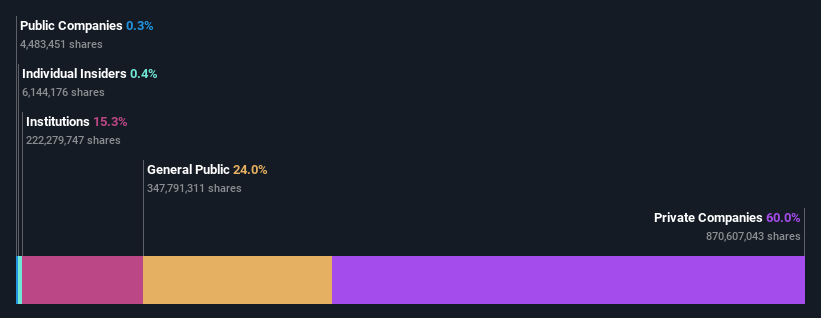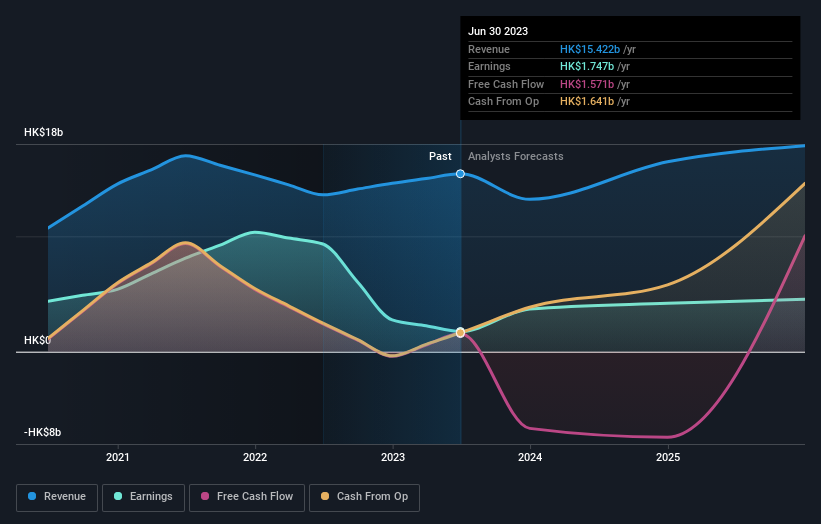- Hong Kong
- /
- Real Estate
- /
- SEHK:683
Private companies are Kerry Properties Limited's (HKG:683) biggest owners and were hit after market cap dropped HK$871m

Key Insights
- Kerry Properties' significant private companies ownership suggests that the key decisions are influenced by shareholders from the larger public
- Kerry Group Limited owns 60% of the company
- Institutional ownership in Kerry Properties is 15%
If you want to know who really controls Kerry Properties Limited (HKG:683), then you'll have to look at the makeup of its share registry. And the group that holds the biggest piece of the pie are private companies with 60% ownership. In other words, the group stands to gain the most (or lose the most) from their investment into the company.
As market cap fell to HK$18b last week, private companies would have faced the highest losses than any other shareholder groups of the company.
In the chart below, we zoom in on the different ownership groups of Kerry Properties.
View our latest analysis for Kerry Properties

What Does The Institutional Ownership Tell Us About Kerry Properties?
Institutions typically measure themselves against a benchmark when reporting to their own investors, so they often become more enthusiastic about a stock once it's included in a major index. We would expect most companies to have some institutions on the register, especially if they are growing.
We can see that Kerry Properties does have institutional investors; and they hold a good portion of the company's stock. This suggests some credibility amongst professional investors. But we can't rely on that fact alone since institutions make bad investments sometimes, just like everyone does. If multiple institutions change their view on a stock at the same time, you could see the share price drop fast. It's therefore worth looking at Kerry Properties' earnings history below. Of course, the future is what really matters.

We note that hedge funds don't have a meaningful investment in Kerry Properties. Kerry Group Limited is currently the company's largest shareholder with 60% of shares outstanding. With such a huge stake in the ownership, we infer that they have significant control of the future of the company. In comparison, the second and third largest shareholders hold about 2.0% and 1.9% of the stock.
While studying institutional ownership for a company can add value to your research, it is also a good practice to research analyst recommendations to get a deeper understand of a stock's expected performance. There are plenty of analysts covering the stock, so it might be worth seeing what they are forecasting, too.
Insider Ownership Of Kerry Properties
The definition of company insiders can be subjective and does vary between jurisdictions. Our data reflects individual insiders, capturing board members at the very least. The company management answer to the board and the latter should represent the interests of shareholders. Notably, sometimes top-level managers are on the board themselves.
Insider ownership is positive when it signals leadership are thinking like the true owners of the company. However, high insider ownership can also give immense power to a small group within the company. This can be negative in some circumstances.
Our most recent data indicates that insiders own less than 1% of Kerry Properties Limited. However, it's possible that insiders might have an indirect interest through a more complex structure. It's a big company, so even a small proportional interest can create alignment between the board and shareholders. In this case insiders own HK$78m worth of shares. It is always good to see at least some insider ownership, but it might be worth checking if those insiders have been selling.
General Public Ownership
With a 24% ownership, the general public, mostly comprising of individual investors, have some degree of sway over Kerry Properties. While this size of ownership may not be enough to sway a policy decision in their favour, they can still make a collective impact on company policies.
Private Company Ownership
We can see that Private Companies own 60%, of the shares on issue. Private companies may be related parties. Sometimes insiders have an interest in a public company through a holding in a private company, rather than in their own capacity as an individual. While it's hard to draw any broad stroke conclusions, it is worth noting as an area for further research.
Next Steps:
I find it very interesting to look at who exactly owns a company. But to truly gain insight, we need to consider other information, too. Like risks, for instance. Every company has them, and we've spotted 3 warning signs for Kerry Properties (of which 1 is a bit concerning!) you should know about.
But ultimately it is the future, not the past, that will determine how well the owners of this business will do. Therefore we think it advisable to take a look at this free report showing whether analysts are predicting a brighter future.
NB: Figures in this article are calculated using data from the last twelve months, which refer to the 12-month period ending on the last date of the month the financial statement is dated. This may not be consistent with full year annual report figures.
Valuation is complex, but we're here to simplify it.
Discover if Kerry Properties might be undervalued or overvalued with our detailed analysis, featuring fair value estimates, potential risks, dividends, insider trades, and its financial condition.
Access Free AnalysisHave feedback on this article? Concerned about the content? Get in touch with us directly. Alternatively, email editorial-team (at) simplywallst.com.
This article by Simply Wall St is general in nature. We provide commentary based on historical data and analyst forecasts only using an unbiased methodology and our articles are not intended to be financial advice. It does not constitute a recommendation to buy or sell any stock, and does not take account of your objectives, or your financial situation. We aim to bring you long-term focused analysis driven by fundamental data. Note that our analysis may not factor in the latest price-sensitive company announcements or qualitative material. Simply Wall St has no position in any stocks mentioned.
About SEHK:683
Kerry Properties
An investment holding company, engages in the development, investment, management, and trading of properties in Hong Kong, Mainland China, and the Asia Pacific region.
Established dividend payer and good value.


